Neiman Marcus 2003 Annual Report Download - page 333
Download and view the complete annual report
Please find page 333 of the 2003 Neiman Marcus annual report below. You can navigate through the pages in the report by either clicking on the pages listed below, or by using the keyword search tool below to find specific information within the annual report.-
 1
1 -
 2
2 -
 3
3 -
 4
4 -
 5
5 -
 6
6 -
 7
7 -
 8
8 -
 9
9 -
 10
10 -
 11
11 -
 12
12 -
 13
13 -
 14
14 -
 15
15 -
 16
16 -
 17
17 -
 18
18 -
 19
19 -
 20
20 -
 21
21 -
 22
22 -
 23
23 -
 24
24 -
 25
25 -
 26
26 -
 27
27 -
 28
28 -
 29
29 -
 30
30 -
 31
31 -
 32
32 -
 33
33 -
 34
34 -
 35
35 -
 36
36 -
 37
37 -
 38
38 -
 39
39 -
 40
40 -
 41
41 -
 42
42 -
 43
43 -
 44
44 -
 45
45 -
 46
46 -
 47
47 -
 48
48 -
 49
49 -
 50
50 -
 51
51 -
 52
52 -
 53
53 -
 54
54 -
 55
55 -
 56
56 -
 57
57 -
 58
58 -
 59
59 -
 60
60 -
 61
61 -
 62
62 -
 63
63 -
 64
64 -
 65
65 -
 66
66 -
 67
67 -
 68
68 -
 69
69 -
 70
70 -
 71
71 -
 72
72 -
 73
73 -
 74
74 -
 75
75 -
 76
76 -
 77
77 -
 78
78 -
 79
79 -
 80
80 -
 81
81 -
 82
82 -
 83
83 -
 84
84 -
 85
85 -
 86
86 -
 87
87 -
 88
88 -
 89
89 -
 90
90 -
 91
91 -
 92
92 -
 93
93 -
 94
94 -
 95
95 -
 96
96 -
 97
97 -
 98
98 -
 99
99 -
 100
100 -
 101
101 -
 102
102 -
 103
103 -
 104
104 -
 105
105 -
 106
106 -
 107
107 -
 108
108 -
 109
109 -
 110
110 -
 111
111 -
 112
112 -
 113
113 -
 114
114 -
 115
115 -
 116
116 -
 117
117 -
 118
118 -
 119
119 -
 120
120 -
 121
121 -
 122
122 -
 123
123 -
 124
124 -
 125
125 -
 126
126 -
 127
127 -
 128
128 -
 129
129 -
 130
130 -
 131
131 -
 132
132 -
 133
133 -
 134
134 -
 135
135 -
 136
136 -
 137
137 -
 138
138 -
 139
139 -
 140
140 -
 141
141 -
 142
142 -
 143
143 -
 144
144 -
 145
145 -
 146
146 -
 147
147 -
 148
148 -
 149
149 -
 150
150 -
 151
151 -
 152
152 -
 153
153 -
 154
154 -
 155
155 -
 156
156 -
 157
157 -
 158
158 -
 159
159 -
 160
160 -
 161
161 -
 162
162 -
 163
163 -
 164
164 -
 165
165 -
 166
166 -
 167
167 -
 168
168 -
 169
169 -
 170
170 -
 171
171 -
 172
172 -
 173
173 -
 174
174 -
 175
175 -
 176
176 -
 177
177 -
 178
178 -
 179
179 -
 180
180 -
 181
181 -
 182
182 -
 183
183 -
 184
184 -
 185
185 -
 186
186 -
 187
187 -
 188
188 -
 189
189 -
 190
190 -
 191
191 -
 192
192 -
 193
193 -
 194
194 -
 195
195 -
 196
196 -
 197
197 -
 198
198 -
 199
199 -
 200
200 -
 201
201 -
 202
202 -
 203
203 -
 204
204 -
 205
205 -
 206
206 -
 207
207 -
 208
208 -
 209
209 -
 210
210 -
 211
211 -
 212
212 -
 213
213 -
 214
214 -
 215
215 -
 216
216 -
 217
217 -
 218
218 -
 219
219 -
 220
220 -
 221
221 -
 222
222 -
 223
223 -
 224
224 -
 225
225 -
 226
226 -
 227
227 -
 228
228 -
 229
229 -
 230
230 -
 231
231 -
 232
232 -
 233
233 -
 234
234 -
 235
235 -
 236
236 -
 237
237 -
 238
238 -
 239
239 -
 240
240 -
 241
241 -
 242
242 -
 243
243 -
 244
244 -
 245
245 -
 246
246 -
 247
247 -
 248
248 -
 249
249 -
 250
250 -
 251
251 -
 252
252 -
 253
253 -
 254
254 -
 255
255 -
 256
256 -
 257
257 -
 258
258 -
 259
259 -
 260
260 -
 261
261 -
 262
262 -
 263
263 -
 264
264 -
 265
265 -
 266
266 -
 267
267 -
 268
268 -
 269
269 -
 270
270 -
 271
271 -
 272
272 -
 273
273 -
 274
274 -
 275
275 -
 276
276 -
 277
277 -
 278
278 -
 279
279 -
 280
280 -
 281
281 -
 282
282 -
 283
283 -
 284
284 -
 285
285 -
 286
286 -
 287
287 -
 288
288 -
 289
289 -
 290
290 -
 291
291 -
 292
292 -
 293
293 -
 294
294 -
 295
295 -
 296
296 -
 297
297 -
 298
298 -
 299
299 -
 300
300 -
 301
301 -
 302
302 -
 303
303 -
 304
304 -
 305
305 -
 306
306 -
 307
307 -
 308
308 -
 309
309 -
 310
310 -
 311
311 -
 312
312 -
 313
313 -
 314
314 -
 315
315 -
 316
316 -
 317
317 -
 318
318 -
 319
319 -
 320
320 -
 321
321 -
 322
322 -
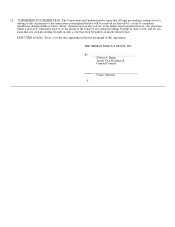 323
323 -
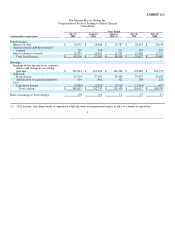 324
324 -
 325
325 -
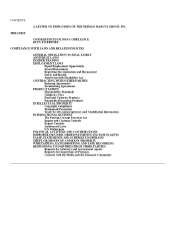 326
326 -
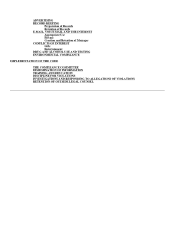 327
327 -
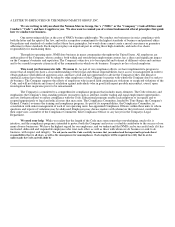 328
328 -
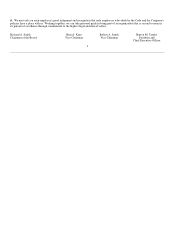 329
329 -
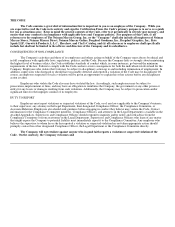 330
330 -
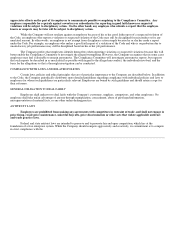 331
331 -
 332
332 -
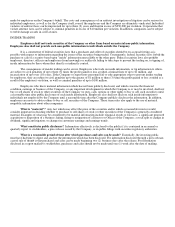 333
333 -
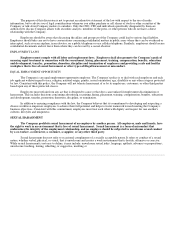 334
334 -
 335
335 -
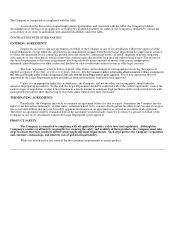 336
336 -
 337
337 -
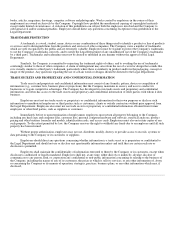 338
338 -
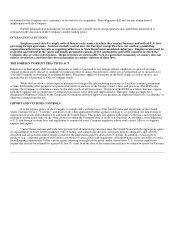 339
339 -
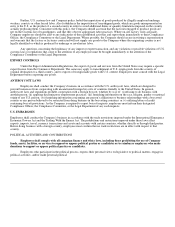 340
340 -
 341
341 -
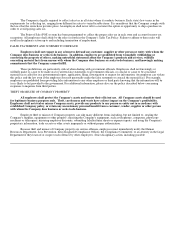 342
342 -
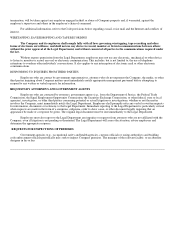 343
343 -
 344
344 -
 345
345 -
 346
346 -
 347
347 -
 348
348 -
 349
349 -
 350
350 -
 351
351 -
 352
352 -
 353
353 -
 354
354 -
 355
355 -
 356
356 -
 357
357
 |
 |

made by employees on the Company's behalf. The costs and consequences of an antitrust investigation or litigation can be serious for
individual employees, as well as for the Company itself, even if the employees and the Company are ultimately vindicated. Individual
violators of antitrust laws can be imprisoned for up to three (3) years and fined in excess of $350,000 per violation. Corporations that
violate antitrust laws can be subject to criminal penalties in excess of $10 million per violation. In addition, companies can be subject
to treble damage awards in civil lawsuits.
INSIDER TRADING
Employees shall not trade securities of the Company or other firms based on material non-public information.
Employees also shall not provide such non-public information to individuals outside the Company.
It is a cornerstone of federal securities laws that a purchaser and seller of securities should be on as equal footing as is
possible with respect to information regarding the issuer of the securities being traded. Consequently, federal securities laws forbid the
purchase or sale of a security based upon "inside" information unavailable to the other party. Federal securities laws also prohibit
employers, directors, officers and employees from knowingly or recklessly failing to take steps to prevent the trading on, or tipping of,
inside information by those whom they directly or indirectly control.
The consequences of insider trading can be severe. Employees who trade on inside information, or tip information to others,
are subject to civil penalties of up to three (3) times the profit gained or loss avoided, criminal fines of up to $1 million, and
incarceration of up to ten (10) years. If the Company or supervisory personnel fail to take appropriate steps to prevent insider trading
by employees, they are subject to civil penalties up to the greater of $1 million or three (3) times the profit gained or loss avoided as a
result of the employee's violation, as well as criminal penalties of up to $100 million.
Employees who know material information which has not been publicly disclosed, and which concerns the financial
condition, earnings or business of the Company, or any important development in which the Company is or may be involved, shall not
buy or sell shares of stock or other securities of the Company (or puts, calls, options or other rights to buy or sell such securities) until
a reasonable time after public disclosure of such inside information. Employees also shall not disclose such inside information to
individuals not employed by the Company until a reasonable time after the Company publicly discloses the information. In addition,
employees are never to advise others to buy or sell securities of the Company. These same rules also apply to the use of material
nonpublic information about other companies.
What is "material"? Any fact which may affect the price of the securities and/or which a reasonable investor would
consider important in deciding whether to purchase or sell shares of stock or other securities of the Company is generally considered
material. Examples of what may be considered to be material information include: financial results or forecasts; a significant proposed
acquisition or disposition of a business; hiring, firing or resignation of a Director or Officer of the Company; a stock split or change in
dividend; significant litigation; or changes in customary earnings and earnings trends.
What constitutes public disclosure? Information effectively is disclosed to the public if it is contained in an annual or
quarterly report to stockholders, a press release issued by the Company, or in public filings with securities regulatory authorities.
What is a reasonable period of time after which purchases and sales can be made? Essentially, the investing public
must have had time to digest and analyze the information which has been disclosed. For information disclosed through a press release,
a good rule of thumb is that purchases and sales can be made beginning two (2) business days after the release. For information
disclosed in a report mailed to stockholders, purchases and sales should not be made until one (1) week after the date of mailing.
